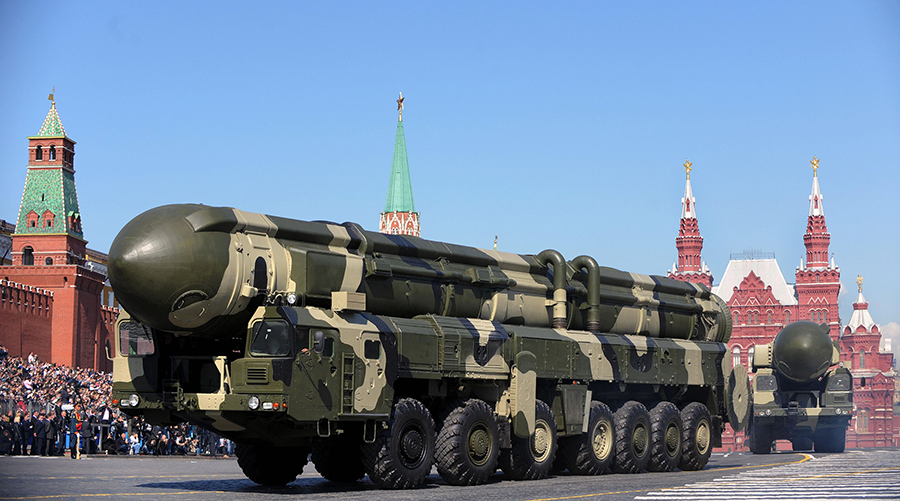"In my home there are few publications that we actually get hard copies of, but [Arms Control Today] is one and it's the only one my husband and I fight over who gets to read it first."
Russia Rejects New Nuclear Arms Talks
March 2024
By Libby Flatoff and Daryl G. Kimball
Russian leaders have rejected a formal U.S. proposal to resume talks “without preconditions” on a new arms control framework to succeed the New Strategic Arms Reduction Treaty (New START) that expires in two years.
 If the decision holds, it means that the only remaining bilateral nuclear arms control agreement limiting the world’s largest nuclear weapons arsenals will expire on Feb. 5, 2026, along with its strict verification provisions.
If the decision holds, it means that the only remaining bilateral nuclear arms control agreement limiting the world’s largest nuclear weapons arsenals will expire on Feb. 5, 2026, along with its strict verification provisions.
In a written response to the United States on Dec. 2 obtained by Arms Control Today, the Russian Foreign Ministry said, “The proposal of the U.S. Side to launch a bilateral dialogue ‘to manage nuclear risks and develop a post-2026 arms control framework’ is unacceptable to us. Such ideas are completely inappropriate and absolutely untimely for they cannot be considered adequate to today’s realities and to the state of Russia-U.S. relations.”
Citing NATO and the “acute conflict around Ukraine,” the Russian diplomatic note also said, “At the moment, the U.S. Side does not demonstrate any interest in a mutually acceptable settlement of the current crisis [Ukraine], does not show readiness to take into account Russia’s security concerns…. Thus, there is no visible basis for a constructive and fruitful dialogue with the United States on strategic stability and arms control.”
The U.S. proposal was first announced by National Security Advisor Jake Sullivan at the annual meeting of the Arms Control Association last June. Sullivan said that the United States is ready to engage in nuclear arms control diplomacy with Russia and with other nuclear-armed members of the nuclear Nonproliferation Treaty (NPT) “without preconditions.”
“Rather than waiting to resolve all of our bilateral differences, the United States is ready to engage Russia now to manage nuclear risks and develop a post-2026 arms control framework,” he said. Three days later, Kremlin spokesperson Dmitry Peskov described Sullivan’s comments as “important and positive.” (See ACT, July/August 2023.)
But by August, Russian officials at the preparatory committee for the 11th NPT Review Conference had already started signaling that, in their view, nuclear arms control talks “cannot be isolated from the general geopolitical and military-strategic context,” which includes the full-scale Russian invasion of Ukraine.
The United States followed up Sullivan’s June speech with a written proposal to Russia that was transmitted in September. (See ACT, December 2023.)
On Jan. 17, Russian Foreign Minister Sergey Lavrov elaborated on Russia’s written response to the U.S. proposal, saying that “amid a ‘hybrid war’ waged by Washington against Russia, we aren’t seeing any basis, not only for any additional joint measures in the sphere of arms control and reduction of strategic risks, but for any discussion of strategic stability issues with the United States.”
Pranay Vaddi, senior director for arms control at the U.S. National Security Council, said at an event hosted by Center for Strategic and International Studies on Jan. 18 that the rejection “linked other politics to arms control in a way that has not been done in the post-Cold War era…[and] as a result, we don’t have a conversation to be had.”
Vaddi expressed disappointment that Russia had not even offered a counterproposal on nuclear arms control and disarmament. In failing to do so, “Russia is minimizing their obligations under the NPT” and not even attempting “to pursue negotiations in good faith” as required by Article VI of that treaty.
Shortly after Russia’s rejection of the U.S. proposal became public, the U.S. State Department on Jan. 31 released its annual report to Congress on the implementation of New START. It said that the United States had 1,419 warheads on deployed intercontinental ballistic missiles, submarine-launched ballistic missiles, and heavy bombers, below the limit of 1,550 deployed warheads permitted by the treaty.
The report said that Russia’s decision to pause New START inspections in 2022 and its failure to provide data on its strategic nuclear forces since it suspended implementation of the treaty in early 2023 “negatively affects the ability of the United States to verify Russia’s compliance” with the New START deployed-warhead limit.
Despite the verification obstacles, the report assesses that Russia “likely did not exceed” the treaty’s deployed-warhead limit in 2023 and “that there is not a strategic imbalance between the [United States] and [Russia] that endangers the national security interest of the United States.”
But the report noted that “due to the uncertainty generated by Russia’s failure to fulfill its obligations with respect to the [t]reaty’s verification regime, the United States was unable to verify that [Russia] remained in compliance throughout 2023 with its obligation to limit its [number of] deployed warheads…to 1,550” on delivery vehicles subject to the treaty.
Deputy Russian Foreign Minister Sergei Ryabkov said in an interview with RIA Novosti on Jan. 22 that, “for now, we are focusing on the task of maintaining the quantitative indicators of strategic offensive weapons at the levels established by the treaty on the condition that further destabilizing steps by Washington will not make such a task meaningless for us.”
